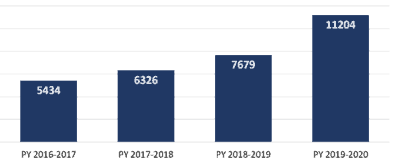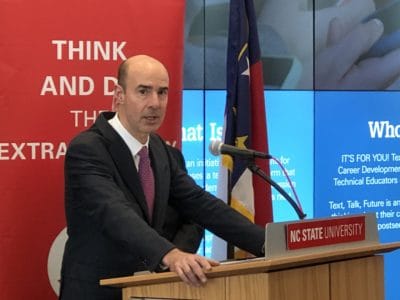The number of registered apprentices in North Carolina has more than doubled over the past four years, according to the latest numbers from ApprenticeshipNC. As of January 1, there are over 11,000 registered apprentices this school year, up from 7,679 last school year and 5,434 in the 2016-17 school year.

On March 5-6, over 200 business, community college, and K-12 education leaders gathered in Durham for the annual ApprenticeshipNC conference. Over the course of two days, apprentices, businesses, and community college representatives shared lessons learned on implementing apprenticeship programs.
What is causing the rapid growth? ApprenticeshipNC Director Kathryn Castelloes attributes it to high demand from business and industry.
“A lot of it has to do with just the demand from employers,” Castelloes said. “Word of mouth is getting around of how employers are working together, how they’re working with community colleges, and how they’re developing their own talent pipeline.”
Business leaders at the conference spoke to the combined pressures of a growing demand for skilled labor and an aging workforce as the reasons why they started an apprenticeship program. According to myFutureNC, North Carolina is projected to have a shortage of 400,000 skilled workers by 2030.
“We started an apprenticeship program because we had to,” said Tammy Simmons, vice president of marketing and culture at Machine Specialities Inc. “We had tried lots of different ways to recruit skilled workers for the type of products that we’re making in our facility. We recruit masters of the craft, the top CNC machinists, and we just were not able to fulfill the numbers that we needed.”
Jim Bryan, president of Fairystone Fabrics, said they decided to become an apprenticeship sponsor because it exposes them to a younger workforce.
“The most important thing is we have been introduced to a pool of candidates that we would never see before because they’re 16, 17, 18 years old,” said Bryan. “It’s a win-win all the way through because we’re fighting the aging workforce issue, just like everybody else.”
Several business owners at the conference were there to learn more about starting an apprenticeship program, including Kevin Robinson, president of RTriad Enterprises in Greensboro.
“We believe the future work is definitely going to change,” said Robinson, “and we want to be a positive influence in that change. So we’re looking at gig economy solutions and things that help people get to work faster and learn to earn.”
Robinson hopes to start an apprenticeship program in cyber security and DevOps (combination of software development and IT operations). “We’re going to focus on closing the gap, which is huge right now. There are 1.5 million job openings in cyber security across the U.S. right now,” he said.
Those like Robinson thinking about starting an apprenticeship program have an advantage, business leaders said. ApprenticeshipNC provides support and coordination to businesses and colleges setting up apprenticeship programs. “It’s kind of like call your friendly neighborhood apprenticeship consultant,” said Mitchell Hardy of Pike Electric.
Students and parents are also becoming more interested in apprenticeships as the ability to “earn while you learn” gets more attractive in the face of increasing higher education costs.
“I pursued the path of becoming an apprentice at Machine Specialties Inc (because) it sets me up for a bright future,” said Garrison Weavil, a fourth-year apprentice. “They pay for your college. … At the beginning, it sounded too good to be true.”
Craig Foucht, executive director of the Wayne Business and Industry Center at Wayne Community College, said that as a parent, he appreciates his kids not having to make the choice between college and workforce.
“That’s a game changer,” he said.
The apprenticeship model presents a third option between the two paths of going to college or entering the workforce after high school. Registered apprenticeships require both work-based learning and classroom instruction, so students and parents see it as a way to get the benefits of both work experience and a college education.
“If you still want to go get your four year degree after you graduate, it sets you up for a smooth transition to that,” said Weavil. “It will allow me to become a better engineer at the very end of it because I’ll have the hands-on portion of it and then also get my degree.”
Castelloes only sees the growth in apprenticeships continuing, especially in industries that have not traditionally had apprenticeship programs in the state. Castelloes has seen interest from the health care industry, including the assisted living sector.
Walter Siegenthaler, whom Castelloes referred to as the godfather of apprenticeships in North Carolina, said he expects to see growth in health care and other industries.
“It’s great to have manufacturers, but I think there is so much potential in other fields like in health care,” he said. “There is a lot more to be done, and I think that we are on the right track.”
Recommended reading



